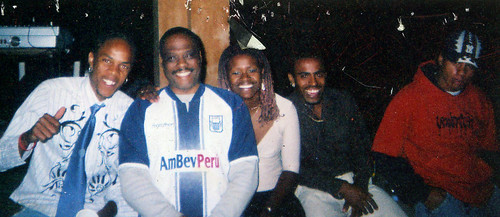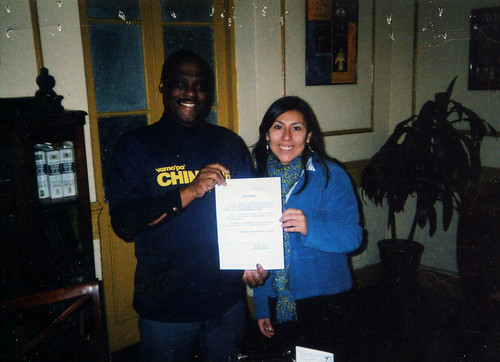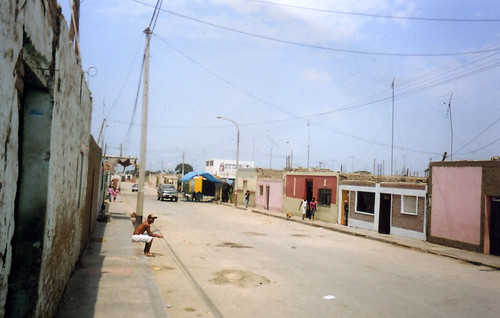What makes my travel experience so different from your average tourist, especially to a Latin American country, is my preference to be with local people, and as far away from other gringos as possible. This way, I can be totally immersed in the Spanish language as I seek to explore the Latin American black experience, history, and cultures.
Marion, a member of my Toastmasters club, asked me how do the blacks in Latin America view me, considering that I'm black like they. My response was that I'm seen as a Gringo first, with a pocket full of money, and as a fellow black person second. The fact that I'm black seems to make them feel that I would be an easier and more sympathetic mark. This is not to take away from the good relationships with many of the black people I meet, like Gloria, a friend I met in Ecuador who treated me like a long, lost brother and made my visit a rewarding one. Overall, I have been embraced and made to feel at home without expecting even a ten-cent tip.

Street hustlers, known in Cuba as jineteros, got frustrated trying to set me up when a lady friend got my attention and lured me away from them.
On the other hand, however, I'm often seen as a quick hustle, a glorified ATM machine. For example, there was Javier, a black Peruvian whom I befriended and who eventually got around to making it a habit of asking me for money. To this day, he sends repeated e-mail requests, which now goes directly to my spam folder. In Colombia, a black cabbie wanted to charge me extra for a fair that I knew cost considerably less. Street hustlers, known in Cuba as jineteros, got frustrated trying to set me up when a lady friend got my attention and lured me away from them. They weren't going to rob me or anything, just wanted to entice me to spend money so they, and supposedly I, could have a good time. On Facebook, I met a man from Venezuela, where I'm planning my next trip, who immediately tried to lure me into reserving an expensive tourist hotel with a kitchen so he can get a kickback from the hotel manager.
Then you have the gold diggers, the women (men too) who think every American is in the same income bracket as Bill Gates or Donald Trump. They would woo gringos into marrying them so they can come to live in the USA legally. I mysellf have been to 13 different countries, and have been approached by women from nine wanting to marry me for this reason and this reason only.
All in all, I'm very much in tune with my own travel purposes; language and cultural immersion, and to explore the black experience. If this means giving to the needy (and not the greedy) along the way, I'm more than happy to do that as long as I'm not being hustled. In fact, the money that I do circulate, for noble and empathetic causes, are of far greater value to me than the money I could be spending on myself in a fancy, resort hotel or on expensive tour guides.

Street hustlers, known in Cuba as jineteros, got frustrated trying to set me up when a lady friend got my attention and lured me away from them.
On the other hand, however, I'm often seen as a quick hustle, a glorified ATM machine. For example, there was Javier, a black Peruvian whom I befriended and who eventually got around to making it a habit of asking me for money. To this day, he sends repeated e-mail requests, which now goes directly to my spam folder. In Colombia, a black cabbie wanted to charge me extra for a fair that I knew cost considerably less. Street hustlers, known in Cuba as jineteros, got frustrated trying to set me up when a lady friend got my attention and lured me away from them. They weren't going to rob me or anything, just wanted to entice me to spend money so they, and supposedly I, could have a good time. On Facebook, I met a man from Venezuela, where I'm planning my next trip, who immediately tried to lure me into reserving an expensive tourist hotel with a kitchen so he can get a kickback from the hotel manager.
Gloria, a lifetime friend, I met in Ecuador treated me like a long lost brother and made my visit a rewarding one.
Then you have the gold diggers, the women (men too) who think every American is in the same income bracket as Bill Gates or Donald Trump. They would woo gringos into marrying them so they can come to live in the USA legally. I mysellf have been to 13 different countries, and have been approached by women from nine wanting to marry me for this reason and this reason only.
All in all, I'm very much in tune with my own travel purposes; language and cultural immersion, and to explore the black experience. If this means giving to the needy (and not the greedy) along the way, I'm more than happy to do that as long as I'm not being hustled. In fact, the money that I do circulate, for noble and empathetic causes, are of far greater value to me than the money I could be spending on myself in a fancy, resort hotel or on expensive tour guides.









